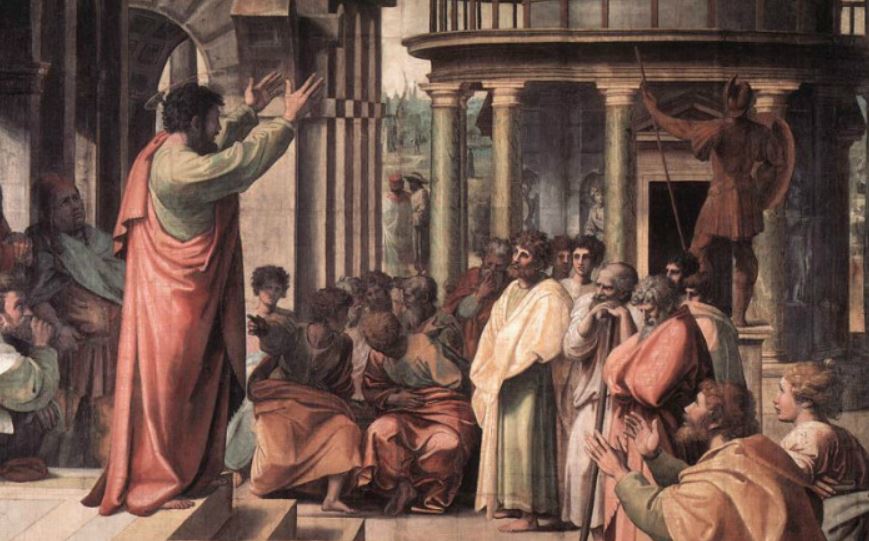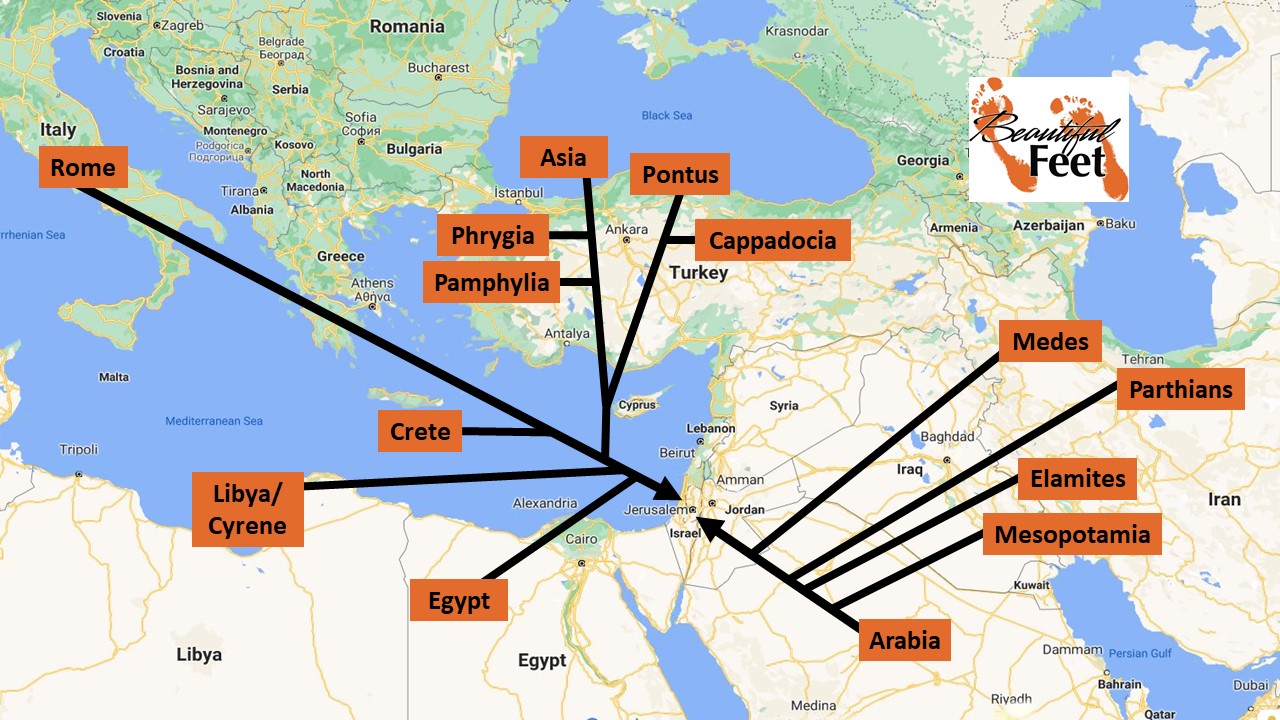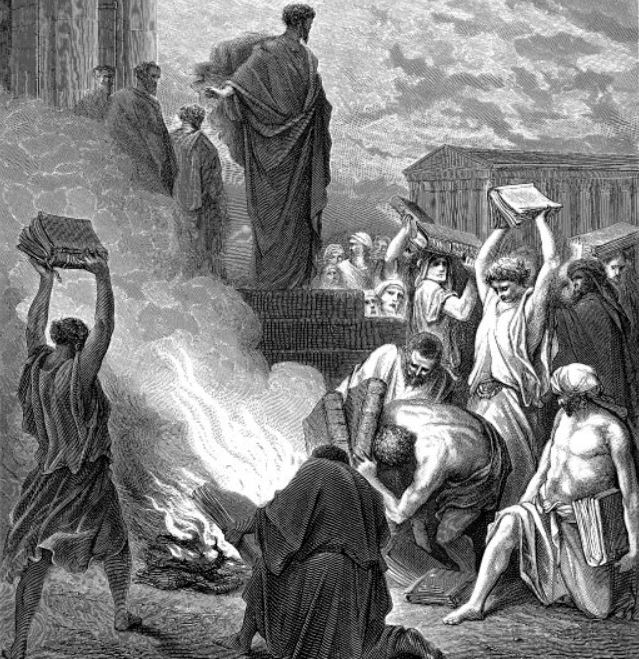30 A.D. Revival on the Day of Pentecost


Introduction
The revival on the Day of Pentecost was but a continuation of the revival that commenced with John the Baptist, and was later enflamed through the ministry of Jesus and His disciples. Those revival accounts can be read with these links:
► 26 A.D. Revival Under John the Baptist
► 27 A.D. Revival Under Jesus and His Disciples
Significance of the Day of Pentecost
We are not going to use this post to outline the purpose and significance of the Day of Pentecost, as found in Acts 2, nor to discuss the outpouring of the Holy Spirit and the subsequent manifestations of the Spirit, like the spiritual gifts, but we do want to indicate that what occurred on this day was far more than a revival. This was a day on which The Church began, and it was also the day on which God came and dwelt within the individual follower of Jesus.
► The Old Testament limited the average individual’s access to the presence and power of God. One example is that the ordinary person was restricted from entering His presence. Even the High Priest was only allowed to enter the presence of God one time per year, on the Day of Atonement (Hebrews 9:6-8).
► Following the baptism of the Holy Spirit on the Day of Pentecost, every individual, regardless of race or status in life, obtained equal access to the presence of God (Ephesians 3:12; Hebrews 4:16; 10:18-20).
► While Jesus was on earth, He was Immanuel (God with us—Matthew 1:23), but He could only be in one place at one time. With Him departing from His followers, He made it possible for His Spirit (Romans 8:9; Philippians 1:19;.1 Peter 1:11) to be sent to dwell within each one of us (John 14:16-19; 14:27-29; 16:5-7; Acts 1:8).
► This access to the presence of God, and the infilling of the Holy Spirit, made it possible for anyone to be empowered with the fruits and gifts of the Holy Spirit (1 Corinthians 12:7-14; Romans 12:5-8; Galatians 5:22-23).
Prophecies of the Day of Pentecost
The First: The Old Testament prophet Joel, who wrote around 835 B.C., foretold of what was to occur.
Then, after doing all those things,
I will pour out my Spirit upon all people.
Your sons and daughters will prophesy.
Your old men will dream dreams,
and your young men will see visions.
In those days I will pour out my Spirit
even on servants—men and women alike…
But everyone who calls on the name of the Lord
will be saved… (Joel 2:28-29; Acts 2:17-21).
Note other Old Testament prophecies from Isaiah, Ezekiel, and Zechariah (Isaiah 32:14-15; 44:3; Ezekiel 36:27; 39:28-29; Zechariah 12:10).
The Second: John the Baptist foretold of what was going to occur:
I baptize with water those who repent of their sins and turn to God. But someone is coming soon who is greater than I am—so much greater that I’m not worthy even to be his slave and carry his sandals. He will baptize you with the Holy Spirit and with fire (Matthew 3:11).
The Third: Jesus foretold of this upcoming baptism in the Holy Spirit:
After Jesus’ resurrection, for 40 days He would appear to His followers from time to time. During each appearance He gave evidence that He was truly alive (Acts 1:3). Jesus also told them not to leave Jerusalem until the Father sends His promise, as foretold in Joel 2:28-29), which Jesus said was a baptism with the Holy Spirit (Acts 1:4-5; 2:33; Galatians 3:14).
Once when he was eating with them, he commanded them, “Do not leave Jerusalem until the Father sends you the gift he promised, as I told you before. John baptized with water, but in just a few days you will be baptized with the Holy Spirit (Acts 1:4-5; John 7:37-39; 16:14-17; Acts 11:15-16).
Jesus informed His followers at this time that this baptism with the Holy Spirit would be a baptism of power which would enable them to accomplish His mission throughout the world (Acts 1:8).
Also note Paul’s mention of the promised Holy Spirit (Ephesians 1:13).
Extraordinary Prayer
Extraordinary and unified prayer almost always precedes revivals, just like the one that occurred prior to this revival (Acts 1:4-5; 2:1).
Note a few things about this prayer meeting:
► It continued for 10 days, following Jesus’ ascension.
► There were about 120 that were in the upstairs room of the home, and it was not only a room for prayer, it was also the location where they were staying during those 10 days preceding the Day of Pentecost (Acts 1:12-15).
► There were women present in that upstairs room with the disciples. The brothers (and quite possibly sisters) of Jesus were also there. In the earlier part of Jesus’ ministry His brothers did not believe Jesus was the Messiah (John 7:5), but after His death, burial, and resurrection, they are found to have embraced the claims He made of His divinity (Acts 1:13-14).

The baptism in the Holy Spirit (Acts 2:1-4)
Prior to Peter’s Sermon
Note the events leading up to Peter’s sermon on this day:
► On the Day of Pentecost, as the believers were meeting together in one place, “there was a sound from heaven like the roaring of a mighty windstorm” (Acts 2:2).
► It appears as though the “flames,” or “tongues of fire” were witnessed by those who also heard them speaking in languages they never learned (Acts 2:3).
► With “devout Jews from every nation” being present, who heard the “mighty windstorm,” as well as the people speaking in their own foreign languages (Acts 2:6), it built faith to believe what Peter was about to preach.

Peter preaching on the Day of Pentecost
Peter Addresses the Crowd that Was Assembled
Due to the miraculous signs that were heard and seen, people came running to see what was happening (Acts 2:6). Some assume that miracles would convince people of the truth, but remember, Jesus was crucified a mere 50 days earlier, and He had performed countless miracles through His three years of ministry, and Jerusalem was still very hardened against the Gospel.
The first thing Peter did was address the mockers:
Some stated that those who were speaking in unlearned languages were merely “drunk” (Acts 2:13-14). It makes one wonder how they could have come to that conclusion, as an intoxicated person can barely speak in their own language. Drunkenness could also not explain the roar of a mighty windstorm, nor the flames of fire that were over the heads of the believers who were speaking in unlearned languages.
Peter then tells the crowd what they were witnessing, and it was the fulfilment of the prophecy written in Joel 2:28-29 (Acts 2:17-21).
He then continued with his sermon, explaining that Jesus was the Messiah, and that they crucified Him (Acts 2:14-36).
Conviction Power
There was something profoundly different in Peter’s sermon after the coming of the Holy Spirit, and it was that his words were now supercharged. With the Holy Spirit carrying his words along, penetrating even the most stubborn and hardest of hearts (Acts 2:37a), his words brought forth an immediate response from the crowd:
Brothers, what should we do (Acts 2:37b)?
The response led to about 3,000 placing their faith in Jesus as the Messiah, and with it we witness the formation of The Church (Acts 2:41-47).

In Jerusalem on the Day of Pentecost were “devout Jews from every nation.” Some say at least 1 million Jews were present. These people had traveled there to celebrate the Feast of Pentecost. It was these people who heard the 120 speaking in foreign languages which they had never learned. And according to reports, they were telling “about the wonderful things God has done” (Acts 2:5-12). It was these people who were undoubtedly instrumental in aiding in the rapid transmission of the Gospel throughout the world.

As the revival spread to Ephesus, the new converts burned several million dollars worth of their witchcraft books (Acts 19:19).
Some of the Results of the Revival
► About 3,000 added to the Church (Acts 2:41).
► People were being converted every day through the unity of the people (Acts 2:43-47)
► 5,000 were added to the church (Acts 4:4).
► “Yet more and more people believed and were brought to the Lord—crowds of both men and women” (Acts 5:14).
► “The number of believers greatly increased in Jerusalem, and many of the Jewish priests were converted, too” (Acts 6:7).
► “The church … throughout Judea, Galilee, and Samaria, … became stronger…. And… it also grew in numbers” (Acts 9:31).
► A large number of Gentiles turned to the Lord (Acts 11:21).
► Many people were brought to the Lord (Acts 11:24).
► The word of God spread and there were many new believers (Acts 12:24).
► A great number of Jews and Greeks became believers (Acts 14:1).
► They made many disciples (Acts 14:21).
► The churches grew larger every day (Acts 16:5).
► A great multitude joined Paul and Silas (Acts 17:4).
► Some became believers (Acts 17:34).
► The story spread quickly, and many became believers (Acts 19:17-20).
► Many thousands of Jews believed (Acts 21:20).
► Some were persuaded (Acts 28:24).

Stephen, one of the first martyrs during this revival, was stoned to death (Acts 7:58-60).
Persecution Did not Stop this Revival
The revival that began on the Day of Pentecost spread through the Roman Empire, among Jews and Gentiles, and it occurred despite severe persecution.
► Persecution from Jewish religious leaders (Acts 4:1-3; 5:17-18, 40; 7:58; 8:1-3; 9:1-2; 18:12; 21:27-32).
► Persecution from pagans (Acts 13:8; 14:19; 16:22-24; 19:28-29).
► Persecution from the Roman government (Acts 12:1-3; 13:50; 14:2-5; 24:27).
What is Hindering Revival Today?
There is only one thing that can hinder a revival, and it is a lack of desire in the individual. A person can experience personal revival whenever they want it. And if there is a congregation, and every person in that congregation decides to live obediently, there will automatically be a corporate revival.
Read our nine Considerations (barriers to revival) and observe that God always wants to see His Church living in a revived state. It is the people themselves that must first want it, and the evidence of their desire is in the decisions they make.
Return to List of Revival Stories
Chet & Phyllis Swearingen:
Office: (260) 920-8248
romans1015@outlook.com
Beautiful Feet
P.O. Box 915
Auburn, IN 46706

